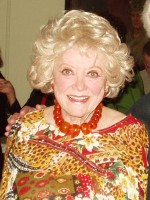How to Live Forever is a american film of genre Documentary released in USA on 13 may 2011 with Suzanne Somers
How to Live Forever (2011)
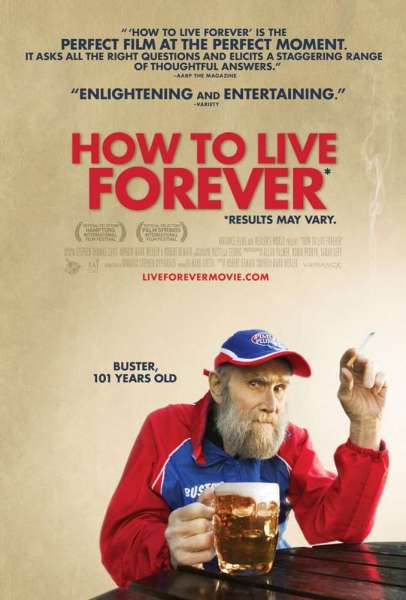
If you like this film, let us know!
- Infos
- Casting
- Technical infos
- Photos
- Videos
- Film quotes
- Characters
- Music
- Awards
How to Live Forever, written by director Mark Wexler and Robert DeMaio, is a documentary that follows Mark on a three-year pilgrimage to discover the best practices and philosophies to help mitigate "the uncool trappings of old age." With the death of his mother (artist Marian Witt-Wexler) and the arrival of an AARP card, Wexler begins to wonder if one can truly achieve immortality. He interviews an eclectic group of celebrities, health care professionals, centenarians, followers of Laughter Yoga, and scientists contemplating technology’s impact on the average lifespan in an attempt to conquer death.
Wexler ventures into the home of fitness legend Jack LaLanne and his wife Elaine for a personal training session and a raw food smoothie. Often called the "godfather of fitness", Jack LaLanne was among the first to publicly preach the health benefits of regular exercise and a good diet. In 1936, when LaLanne was 21 years old, he opened one of the nation’s first fitness gyms, and in the 1950s he filmed a series of television exercise programs. LaLanne invented several exercise machines, was inducted to the California Hall of Fame in 2008, and has a star on the Hollywood Walk of Fame.
In the documentary, Suzanne Somers speaks to the International Congress on Anti-Aging Medicine in Las Vegas. She describes the array of hormones that she takes daily, explaining why she is a supporter of bioidentical hormone replacement therapy. Author of numerous diet books and autobiographies, Somers also wrote Ageless: The Naked Truth About Bioidentical Hormones. Somers is an actress, author, and businesswoman, best known for her role as Chrissy Snow on Three’s Company.
Aubrey de Grey is a British author and theoretician in the field of gerontology. His studies focus on researching and developing tissue-repair strategies intended to prolong lifespans. De Grey is the editor-in-chief of the academic journal Rejuvenation Research, author of The Mitochondrial Free Radical Theory of Aging, and co-author of Ending Aging. Wexler, as well as news sources like The New York Times, the BBC, and Fortune, have interviewed de Grey to learn more about his theories on anti-aging.
Also featured in the documentary is celebrated American writer Ray Bradbury, who is best known for his books Fahrenheit 451, The Martian Chronicles, and Something Wicked This Way Comes. The Pulitzer board recognized Bradbury "for his distinguished, prolific, and deeply influential career as an unmatched author of science fiction and fantasy." Many of his works have been adapted into television shows or films. When asked if he’s afraid of getting old, Bradbury replies, "No, I’ve never had that fear; I knew that I was collecting truths along the way."
Comedienne Phyllis Diller has maintained the stage presence of a boisterous, eccentric housewife with an unusual laugh in stand-up and sit-coms since 1952. She has guest-starred in dozens of television shows and also voiced the Queen in Disney’s A Bug's Life, Jimmy’s grandmother in Nickelodeon’s Jimmy Neutron, and Peter Griffin’s mother in Family Guy. In the documentary, Diller believes comedy is important to health, maintaining that "laughter fluffs up every cell in the body."
Claiming to have been born in 1906, Pierre Jean Buster Martin was a 104-year-old beer drinking and chain-smoking marathon runner. He did not include fish, dairy, tea, or water in his diet. Buster smoked since he was seven-years-old and followed a diligent regimen of beer, cigarettes, and red meat. In 2008, Buster successfully finished the London Marathon. When Buster was not training for marathons, he cleaned vans for Pimlico Plumbers in southeast London. On April 12, 2011 Buster finished work, had a beer, and went home. He died that night, at age 104.
Jonathan Gold, a food critic who writes for LA Weekly, shares an Oki Dog and his philosophy of food with Wexler. Gold claims that "eating is one of the great pleasures of life", and believes that those with diet restrictions are missing out on a lot that life has to offer. He is the author of Counter Intelligence and has written for several magazines throughout his lifetime. In 2007, Gold became the first critic to win the Pulitzer Prize.
Dr. Madan Kataria gives viewers of the documentary a prescription for longevity: "Laugh ten minutes every day for no reason." Known as the "Guru of Giggling", Kataria researched the physiological and psychological benefits of laughter and started a Laughter Yoga club in 1995 with just five people in a public park in Mumbai. The unusual exercise routine combines yoga breathing with laughter exercises, and it has grown to more than 6,000 Laughter Yoga clubs in over 60 countries.
In the documentary, Eleanor Wasson reveals that being a vegetarian and drinking vodka every night are a few secrets to her 100-year lifespan. Throughout her life, Wasson was a volunteer, an activist, and a devotee to social and political causes of various kinds. She was the founder of WomenRise for Global Peace and had been a long-time fighter against the spread of nuclear weapons. For thirty years, Wasson was the Coordinator of Volunteer Services for UCLA. She died April 6, 2008.
Pico Iyer, a British-born novelist, essayist, and travel writer, also makes an appearance in the documentary. He regularly contributes to Time, National Geographic, and the New York Times on various subjects. Iyer is a close friend of the director and is, Wexler claims, "the sanest person I know." He turns the camera on Wexler, asking the director to examine his own hopes and intentions for making the documentary. He asserts that like the ending of books and films, "death makes sense of everything that comes before it."
The documentary, contrary to its title, is not a how-to guide to eternal life. Rather, it is an examination of different philosophies and perspectives on life, offering viewers a glimpse into the science and commercialism in fields like funeral planning, cryonics, and anti-aging practices. Meanwhile, the film challenges viewers to examine their own notions of whether to combat or accept the inevitability of aging; it is this dilemma that drives Wexler’s search both around the world and within himself, asking the question, "If you could take a pill to live 500 more years, would you?"
How to Live Forever premiered at the 17th Annual Hamptons International Film Festival in 2009. It was also screened at the Palm Springs International Film Festival in January 2011 and the Gasparilla International Film Festival in March 2011.
In addition to How to Live Forever, Mark Wexler directed Tell Them Who You Are (2004), about his father, cinematographer Haskell Wexler, and Me and My Matchmaker (1996). He also co-produced Air Force One (2002). Me and My Matchmaker won an Audience Award for Best Documentary at the 2006 Slamdance Film Festival.
Robert DeMaio, director of the 1983 TV series Against the Odds and writer of TV documentary Reversal of Fortune (2005), co-wrote Tell Them Who You Are and Me and My Matchmaker with Wexler.
Mark Luethi, co-producer of How to Live Forever and associate producer of Tell Them Who You Are, is currently a freelance photographer.
Stephen Dypiangco, Producer of Marketing and Distribution for 2011 Oscar-winner God of Love, is also Producer of Marketing and Distribution for How to Live Forever.
Synopsis
Filmmaker Mark Wexler is not going down without a fight. Overwhelmed by the loss of his mother and confronted by his own advancing age, Wexler embarks on a curious, lively, and sometimes troubling worldwide trek to investigate what it really means to live forever.Actors
Comments
Leave comment :
Suggestions of similar film to How to Live Forever
There are 34 films with the same actors, 8942 with the same cinematographic genres, 2422 films with the same themes, to have finally 70 suggestions of similar films.If you liked How to Live Forever, you will probably like those similar films :

I Am Comic (2010)
, 1h27Directed by Jordan Brady
Origin USA
Genres Comedy, Documentary
Themes Documentaire sur une personnalité
Actors Sarah Silverman, Ahmed Ahmed, Phyllis Diller, Franklyn Ajaye, Janeane Garofalo, Ant
Rating64%





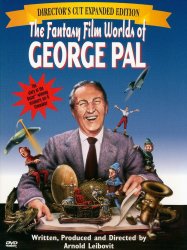 , 1h33
, 1h33Directed by Arnold Leibovit
Origin USA
Genres Documentary
Themes Documentary films about business, Documentary films about the visual arts, Documentary films about the film industry, Documentaire sur une personnalité
Actors George Pal, Robert Bloch, Chesley Bonestell, Ray Bradbury, Tony Curtis, Joe Dante
Rating72%





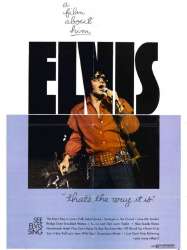
Elvis: That's the Way It Is (1970)
, 1h48Directed by Denis Sanders
Origin USA
Genres Documentary, Musical
Themes Films about music and musicians, Documentary films about music and musicians, Documentaire sur une personnalité, Musical films
Actors Elvis Presley, Cary Grant, Sammy Davis Jr., Red West
Rating78%





Le King vous donne rendez-vous pour un concert mythique à Las Vegas en 1970. Ce concert, filmé en 6 soirées, nous montre un Elvis au meilleur de sa forme qui électrise la salle en interprétant ses plus grands succès.

Life Itself (2014)
, 2h1Origin USA
Genres Biography, Documentary
Themes Films about writers, Films about journalists, Documentary films about business, Documentary films about the film industry, Documentaire sur une personnalité, Documentary films about cities
Actors Roger Ebert, Stephen Stanton, Werner Herzog, Martin Scorsese, Errol Morris, Ramin Bahrani
Rating77%





Un documentaire inspiré des mémoires éponymes du critique de cinéma américain et chroniqueur social mondialement connu : Roger Ebert. Lauréat du Prix Pulitzer pour ses critiques publiées dans le Chicago Sun-Times, Roger Ebert est devenu l’une des personnalités les plus influentes du monde de la culture aux États-Unis.

The Eye of the Storm (1970)
Origin USA
Genres Documentary
Themes Medical-themed films, Films about racism, Documentary films about racism, Documentary films about law, Documentaire sur une personnalité, Documentary films about health care, Films about psychiatry
Rating82%





William Peters follows Jane Elliott's conversely controversial and lauded schoolroom exercise of dividing an otherwise homogenous group of elementary school kids by their eye color. It was a demonstration of prejudice and discrimination meant to teach the students about the unfairness of racism, developed as a response to the shooting of Martin Luther King in April 1968. The film records Elliott in 1970 while conducting the exercise for the third time.

Gimme Shelter (1970)
, 1h31Origin USA
Genres Documentary, Musical
Themes Films about music and musicians, Documentary films about music and musicians, Documentaire sur une personnalité, Musical films
Actors Mick Jagger, Mick Taylor, Melvin Belli, Tina Turner
Rating77%





Ce documentaire de la tournée américaine des Rolling Stones en1969, est devenu un symbole poignant de la disparition de l'époque "Peace and Love". Après une tournée couronnée de succès au travers des Etats-Unis, les Rolling Stones effectuent en décembre un concert gratuit à Altamont Speedway en Californie. Le groupe à choisi imprudemment les Hells Angels pour assurer la sécurité. Les motards ont recours à la violence pour maintenir en ordre une foule agitée, stone, et souvent nue. Le résultat: des dizaines de blessés et la mort à l'écran d'un jeune homme noir (pendant "Sympathy for the Devil") par un membre de la sécurité. De façon arrangée, mais efficace, les frères Maysles filment Mick Jagger dans la salle de montage regardant l'assassinat projeté pour la première fois. Le film fonctionne aussi comme un documentaire du rock-and-roll, capturant la bande pendant leur moments les plus détendus, enivrant, et électrisant.

Girls Aloud: Home Truths (2005)
, 1hGenres Documentary, Musical
Themes Films about music and musicians, Documentary films about music and musicians, Documentaire sur une personnalité, Musical films
Actors Sarah Harding
Rating74%





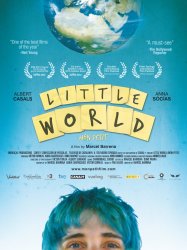
Little World (2013)
Genres Documentary
Themes Films about children, Medical-themed films, Documentaire sur une personnalité, Documentary films about health care, Films about cancer, Films about disabilities
Rating78%





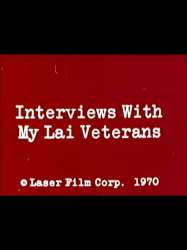 , 22minutes
, 22minutesDirected by Joseph Strick
Origin USA
Genres War, Documentary
Themes Politique, Documentary films about law, Documentary films about war, Documentary films about historical events, Documentaire sur une personnalité, Documentary films about health care, Political films
Rating73%





Le film apporte des témoignages de cinq soldats à propos du Massacre de Mỹ Lai intervenu en mars 1968 lors de la guerre du Viet Nam, et ayant fait plus de 500 victimes dont beaucoup de femmes, enfants et vieillards. Sur les 110 soldats qui ont participé au massacre, sept ayant démissionné de l'armée acceptent de témoigner, mais deux mentent en affirmant n'y avoir pas participé, et leur témoignage n'est finalement pas retenu. Sur les cinq autres, trois essayent de se justifier.

Jack Johnson (1970)
, 1h30Origin USA
Genres Documentary
Themes Sports films, Martial arts films, Boxing films, Documentary films about sports, Documentaire sur une personnalité
Actors Brock Peters
Rating71%





 Connection
Connection

